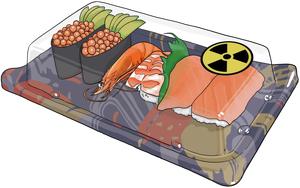 (JIN DING / CHINA DAILY)
(JIN DING / CHINA DAILY)
Japan announced on Tuesday that it would discharge radioactive water from the crippled Fukushima Daiichi nuclear power plant into the sea, claiming it was the best option despite strong opposition from both home and abroad, especially from neighboring countries including China and the Republic of Korea.
Last month, Japan told Rafael Mariano Grossi, director general of the International Atomic Energy Agency, that it hoped the United Nations nuclear watchdog would conduct a safety review and endorse its decision.
Later, in response to the concerns raised by other countries, Grossi informed Wang Qun, China's envoy to the UN and other international organizations in Vienna, that the IAEA would assess as well as monitor the dumping of the radioactive water in an impartial, objective and scientific manner.
Given these facts, the world cannot afford to turn a blind eye to Japan’s dangerous plan
Wang, on his part, said China, as a neighbor of Japan, along with all other stakeholder countries should be involved in the agency's work, because the contaminated water from Fukushima posed a serious threat to not only the marine environment but also the people in neighboring countries, especially the fishing communities.
Japan's plan to release more than 1 million tons of highly contaminated water into the ocean, to put it simply, is irresponsible. The international community, especially neighboring countries such as China and the ROK, have raised objections against the decision, urging the Japanese government to fulfill not only its national but also international obligations.
Despite the domestic and international opposition, however, the Japanese government has decided to go ahead with the plan, endangering the marine environment and biodiversity and, in the process, revealing its selfish and hypocritical side.
An earlier German study that conducted simulations showed that if contaminated water from the Fukushima site were released into the sea, the radioactive materials could spread to most of the Pacific Ocean within 57 days, and would be found in all the oceans in a decade.
And although countries such as the United States and Australia will also become victims of the contamination, they have chosen to ignore the facts and maintain a studied silence over the Japanese government's evidently hazardous decision.
In fact, the US administration is clear that discharging such a huge volume of radioactive water into the sea, even after treating and filtering it, will damage the global marine environment.
Incidentally, the Yoshihide Suga administration announced the decision before Suga's visit to the US, where he is supposed to meet with US President Joe Biden on Friday, which suggests the plan enjoys the support of the US administration. Due to the double standard the Biden administration seems to be using on this specific environmental issue, the US, which has always claimed to attach great importance-except during the Donald Trump presidency-to environmental issues, might end up shooting itself in the foot.
The truth is, Japan has other options to deal with the contaminated water, including further treatment and underground reservoirs. Besides, as experts have suggested, to store the radioactive water in special water storage tanks is the best solution so far.
Yet the Japanese government has chosen the cheapest but extremely harmful way to deal with the radioactive water, which could threaten the health of people across the world.
Given these facts, the world cannot afford to turn a blind eye to Japan's dangerous plan. The right thing for the international community to do is to pressure Japan to reverse its decision, in order to protect the global marine environment and human health.
The author is deputy director at the Institute of National Development and Security Studies at Jilin University.
The views don't necessarily represent those of China Daily.


